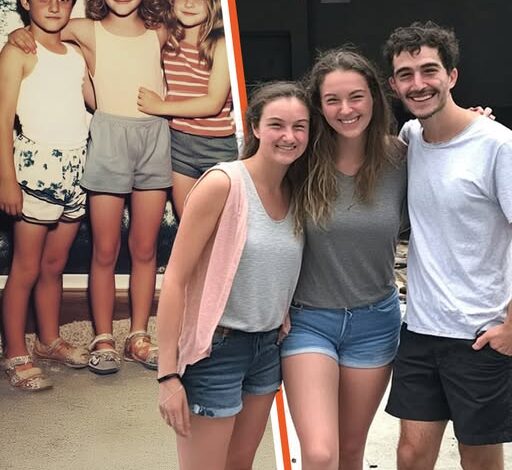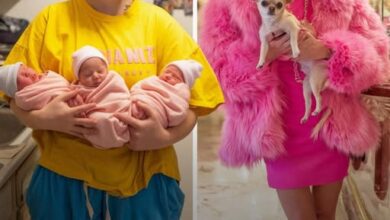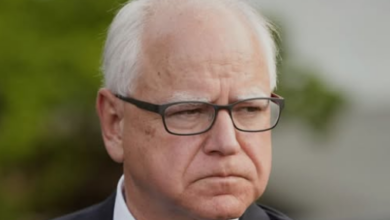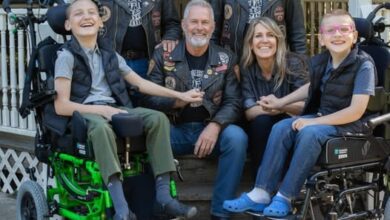
At Age 5, My Two Older Siblings and I Became Orphans but Promised Each Other to Fulfill Our Parents Dream
The night our parents died, my world ended. I was only five years old, too young to understand the permanence of loss, but old enough to feel the emptiness it left behind. One moment we were laughing in the small family café my parents had built from nothing — the next, we were alone.
When the police came to the orphanage door, I didn’t grasp what they meant. “There was an accident,” they said. Just words to me. But when my sister Emma, who was seven, began to sob, and my brother Liam, nine, went completely silent, I realized that “accident” meant we would never see Mom and Dad again.
By the end of the week, the café was closed, the house sold, and everything we had known vanished. Debts we never knew about swallowed what little they left behind. We went from a home filled with laughter and the smell of coffee to a cold orphanage where no one said our names with warmth.
“We’re all we have now,” Liam whispered one night, wrapping his arms around us under a thin blanket. “I’ll take care of you. I promise.”
And somehow, even as a boy, he meant it.
He skipped meals so Emma and I could eat. He pocketed tiny allowances from the caretakers and bought us fruit or candy, always pretending he wasn’t hungry. When the older kids picked fights with me, he was there. When Emma cried herself to sleep, he stayed awake to hold her hand.
One night, as the wind howled through the cracked windows, Liam made us sit up. “Mom and Dad had a dream,” he said, his voice fierce. “They wanted that café to be something special. I don’t know how, but one day, we’re getting it back.”
At the time, I didn’t understand what he meant. I just nodded. Because when Liam said something, you believed him.
A few months later, Emma was the first to leave. A foster family took her in. I remember clinging to her leg, begging her not to go. “It’s okay,” she whispered, trying to smile through her tears. “I’ll visit. Every week.”
She did. Every week she came back, bringing sweets and stories from her new life. “It’s not bad,” she told us once. “They’re nice. But it’s not home.” Liam only nodded. He didn’t trust the system — not after seeing how easily families were split apart.
A year later, it was my turn. My foster parents were kind, but nothing replaced the warmth of my siblings. Liam was the last to leave, but only after we all made one final demand: we’d only go to families who lived close enough for us to see each other. Miraculously, the social workers agreed.
We grew up in different houses but never apart. Every weekend, we met at the park. Sometimes, we shared stories. Sometimes, we just sat together, eating cheap ice cream and pretending life was normal.
When Liam turned sixteen, he got his first job stocking shelves at a grocery store. The moment he handed Emma and me our first shared milkshake with his own earnings, I saw the pride in his eyes. “This is just the beginning,” he said.
At seventeen, Emma got a job at a local diner. “You wouldn’t believe the things people say when they think waitresses can’t hear,” she told us, dropping into a chair after her shift. Liam smirked. “You gonna spit in someone’s coffee?” She laughed and threw a napkin at him. “Tempting.”
I was too young to help then, but I watched — and learned. Hard work wasn’t a choice for us; it was survival.
By the time I was old enough to work, we were already living on our own again — three siblings in a tiny apartment that barely fit a couch, a bed, and our dreams. Liam slept on the couch without complaint, always saying, “You two need the bed more than me.”
We didn’t have much, but we had each other. And for the first time since losing Mom and Dad, that was enough.
We saved every dollar. No movies, no dinners out, no new clothes unless absolutely necessary. Years passed in a blur of double shifts, cheap meals, and exhaustion. But one night, sitting around our wobbly kitchen table, Liam grinned. “We’re close,” he said.
Emma frowned. “Close to what?”
He leaned forward, eyes bright. “To buying back the café.”
It took eight years. Eight long, grinding years of work. But the day we signed the papers, I felt something break open inside me — a flood of memory, grief, pride, and peace all at once.
Standing inside the dusty café, I ran my hand over the counter where Dad used to lean, chatting with regulars. The old wood was scratched and faded, but it felt like home. Emma squeezed my hand so tightly I thought it might bruise. Liam’s voice cracked as he said, “We did it.”
The place was falling apart — creaky floors, peeling paint, a kitchen that hadn’t seen a meal in a decade. But we poured ourselves into it. We worked nights fixing it up, painting until our arms ached, and scrubbing until our hands blistered.
We kept the name. The Willow Café.
And when we finally opened the doors again, something magical happened. People came. They remembered our parents — how they used to stay open late for a tired trucker, or slip free muffins to the kids who couldn’t afford breakfast. Those same people came back, smiling through tears, saying, “It feels like they never left.”
We weren’t just serving food. We were rebuilding our parents’ dream — one cup of coffee, one act of kindness at a time.
Ten years later, when I was thirty-four, we did something even bigger. We bought back the house.
The one where we grew up. The one where Mom’s laughter used to echo and Dad would hum while fixing the old radio.
The three of us stood outside that door, the same door that had been locked to us for nearly three decades. “Do it together,” Liam said softly.
So we did. All three hands on the key, turning it at once.
The smell of dust and old wood hit us, but underneath it, I swore I could smell coffee and bread — faint ghosts of the mornings we once knew.
Emma whispered, “They should be here.”
Liam’s voice was quiet. “They are.”
Now, we all have our own families, our own homes. But every Sunday, we gather in that house — our house — for dinner. The kids play in the yard while we cook, laugh, and remember. And before we eat, Liam still raises his glass and repeats the words our parents used to say at every meal:
“Only in unity can a family overcome any obstacle.”
He looks at Emma and me, his voice steady and proud. “We proved that. And I know Mom and Dad are proud too.”
We were three children who lost everything. But together, we built it all back — and more.
Because some promises, once made, are too sacred to break.




